Lunch under the fire
Satisfaction during the positional war
A completely different picture was observed during the period of the positional war, temporarily established on the Russian front at the beginning of the 1915 year. Now every neglect of precautionary measures was immediately and very sensitively punished - and soon the slackness and habits of peacetime were put to an end.
At the beginning of 1915, the corps, which included the regiment of V. Panov, occupied fortified positions beyond Warsaw - along the river. Ravke. The front trenches of the regiment stretched along the hills of the right bank of the river. Ravki, west of the village Horsemen. The regimental reserve consisting of 6 mouth was located in dugouts in the forest east of the village of Konopnitsa, which was destroyed to the base by shells, where communication paths led from the trenches through the manor yard and distillery south of the village. The regiment’s headquarters and convoy of the 1st category, apart from the kitchens, were occupied by the Zagurgier farm, which had survived from the fire, and the household part with kitchens and the convoy of the second category were in a dilapidated village. Theodoznov, km in 6 from the trench line. Housing subsidiary institutions were deployed in the area of Bela.
The Germans occupied the commander of the left bank of Ravka. Opponents stood on this line for more than six months and did not show any particular activity, after an unsuccessful attack of German positions in the middle of winter. Contact with the Germans was the closest - since in some places the distance between the Russian and German trenches reached 150 steps, the opponents were always well aware of what was being done on the opposite side. They knew the whole internal routine of the enemy. And they did not mutually violate the established almost normal life - i.e. dined, dined, drank tea on time, and even every week used the bathhouse built by the efforts of a regiment in one of the huts. Theodoznov.
But spring, along with the revitalization of nature, also arouses in people a manifestation of energy that is looking for applications - and in the trenches with the first blow of a warm spring breeze, winter hibernation has stopped. But the section of the regiment so far was of secondary importance, and therefore the whole thing was limited to small reconnaissance and almost aimless firefight, sometimes turning into hurricane fire with the participation of machine guns and artillery.
At the same time, observation of the enemy intensified (both from one side and the other) - to such an extent that it cost only to appear on the battlefield as a small group of people doing any work or going somewhere, moving a cart or the kitchen, as it was right now in that place, "peas were pouring, and at times suitcases plopped." In such an environment, providing people with regular and timely meals, of course, became very difficult, and often impossible, as a result of which the normal order of allowance was violated - they had to eat when there was less risk of bringing food to the trench line.
As we noted above, the marching kitchens of the regiment from the convoy of the 1st category were allocated in the village. Theodoznov, where food was cooked and from where, at a certain time, lunch (between 12 and 14 hours) and dinner (from 19 to 21 hours) were brought to the front lines. Kitchens in the village were not particularly carefully masked and smoked very well. At the indicated time, they drove up to the Konopnitsky forest and stopped on the big road - in front of the tavern destroyed by shells. Where food was distributed to the companies that stood in reserve and were called by phone from the trenches to the people - the last few were appointed from each platoon, with bowlers and camping buckets. At first, the sent people dined themselves, near the kitchens in the forest, and then, filling food with the brought dishes, they carried it in the course of communication to the companies. It goes without saying that such an order could not go unnoticed for a long time, as the German Taube flew over the site about three times a day. It is impossible to suppose that a kitchen column moving in broad daylight, besides still (so that dinner would not cool down), and smoking, remains undetected.
Once, - it was in the middle of April 1915, - the soldiers were waiting for dinner in the Konopnitsky forest, where the battalion commanded by V. Panov was in reserve. It was about 19 hours, and the time was approaching for the next 2 on-duty companies - and then go overnight to the second line of trenches to support (just in case) advanced companies. Finally, the kitchens arrived; at the same time people from the trenches came for food; as usual, distribution began, in this case, of potato soup, which at that time was already a favorite dish and its smell pleasantly tickled its smell, arousing a soldier's appetite. A rather large crowd gathered around the kitchens. Talks began for a long time not seen by fellow countrymen, the transfer of newspapers, letters and parcels that came "from home", artisans who came with kitchens, who visited Bele almost every day and had acquaintance with staff clerks, told all kinds of news and rumors circulating in the rear and for front-line soldiers are rarely available ... In a word, a situation has been created in which it is easy to forget that German guns lurked at some 2 - 3 km, which could be severely punished for manifesting negligence at any time.
And now, when, apparently, they least expected this, suddenly there was a well-known but unpleasant sound of a projectile flying in the air in inches on 6, and after that a characteristic crack was heard somewhere behind. At the moment, everything was quiet, and for a few seconds absolute silence reigned, after which there were heard separate quiet, as if timid, exclamations: “Well, guys, because he is for us” and along with them are already more vigorous: “Well, yes, how can it be that he will spend such shells on your kitchen - oh, you’re a buffet”. - “This, brothers, he foolishly blazed”. And the jokers just laughed: “And, maybe, brothers, he wanted to salt us soup. Run away to see if the suitcase is with salt. But then hissed again above, and there was a gap somewhere to the right of the road, very close. "Brothers, for us". "Wrap the kitchen".
An unimaginable fuss began. Some kitchens turned back and rushed along the road, while others drove into the forest and got stuck there. People scattered through the dugouts. The third shell was already not so prosperous and wounded two soldiers who were driving back with the shards. Further, for more than an hour, the Germans fired on the road and the forest in different directions - but, fortunately, without large losses. As it turned out later, three soldiers were injured by splinters, two kitchens broke, turning over somewhere on a ditch during the "retreat", and some people were left without dinner. After this incident, they immediately became accustomed to caution and began to pay closer attention to the organization of allowances.
The entire convoy was sheltered in Teodoznov, putting it in the yards, and where possible under canopies and under trees (despite the fact that the village was unattainable for field artillery and the heavy one never shot there, airplanes dropped bombs at that time only those points where obviously more significant military institutions were concentrated). They began to cook dinner at night and drove around 6 - 7 for about an hour, when usually both Germans and Russians took people awake at night to rest in the second-line dugouts, leaving only a small number of observation posts in each company in the trenches. Moreover, the kitchens chose a more hidden route, entering the forest. Lunch was not brought immediately to the entire regiment, but in a battalion. Buckets were given into the companies for a tray of food (since a large number of people had to be sent with bowlers, and their movement along the lines of communication, which were also not deep enough and were not blocked, was easily detected by the Germans, as a result of which people were injured). Dinner was delivered in the same way at dusk - before the shooters were brought to the first line of the trenches.
Bread, sugar and tea were distributed to fighters by platoon distributors who received those from artisans for several days at once, along with the delivery of lunch or dinner. Tea was made by soldiers at night in pots here in the dugouts of the second line of trenches, where brick stoves were equipped. Water was taken from the Norton wells located behind trenches in the passageways. In the afternoon, they went to boil water in the destroyed buildings and cellars of the Konopnitsky distillery - since, having noticed smoke on the trench line, the Germans immediately jammed "through the haze" of guns and bombers. Soon, however, it was necessary to limit the visit to the distillery to a minimum need, since a large crowd of people at a certain time was also noticed by the Germans, especially since the soldiers spared no fuel and made such fires that it seemed like a fire - as a result, the enemy’s artillery was somewhat once smashed the plant with shells of various calibers.
In the described period, there was no shortage of food or bread in the trenches of the trench, but of course there wasn’t such an abundance and variety as in East Prussia, and sometimes we had to put up with corned beef and sunflower oil instead of excellent pork , lard and fresh fat cow meat, which happened to be very often washed down with fine German beer or wine. True, they missed the tobacco throughout the entire campaign.
Satisfaction during the battle
Special mention should be made of contentment during fights, although there is no time to think about food in battle - and food is delayed until the end of the battle. And depending on the situation, they found a way to deliver hot food to fighters - mainly at night.
If the battle took on a protracted nature and lasted several days without stopping at night, then you had to completely refuse hot food and eat what is in the duffel bag - i.e. cracker, because it was not possible to bring the kitchen to the battle line due to constant shelling.
The only measure in this case is the change of combat units and their withdrawal to a deeper divisional or sometimes regimental reserve, where there was still the opportunity to send hot food every day.
But be that as it may, but to remain in a hungry position with an abundance of food supplies would be wild, and had to find opportunities and resort to small requisitions in case of stubborn refusal of residents to sell food. To do this, usually from carts of the second category people were sent to nearby villages on carts and bicycles - and there, on trifles, sometimes they bought bread, rolls, crackers, sugar, coffee, salt, sausage, etc., eat, and, thus, although not always fully, they satisfied the existing needs.
There were cases when a regiment convoy of the second category, where all the food was concentrated, for some objective reasons went far from the regiment or simply delayed, not having time to pull up on the night to the regiment in time - here the company commanders themselves had to take care of the urgent procurement of products in place, with no choice, i.e. that comes to hand, just not to go camping with empty kitchens. The situation was sometimes aggravated by the lack of a supply manager, although such cases were very rare, since usually the supply manager always on horseback caught up with the regiment for the night - brought money and supervised the procurement.
To be continued
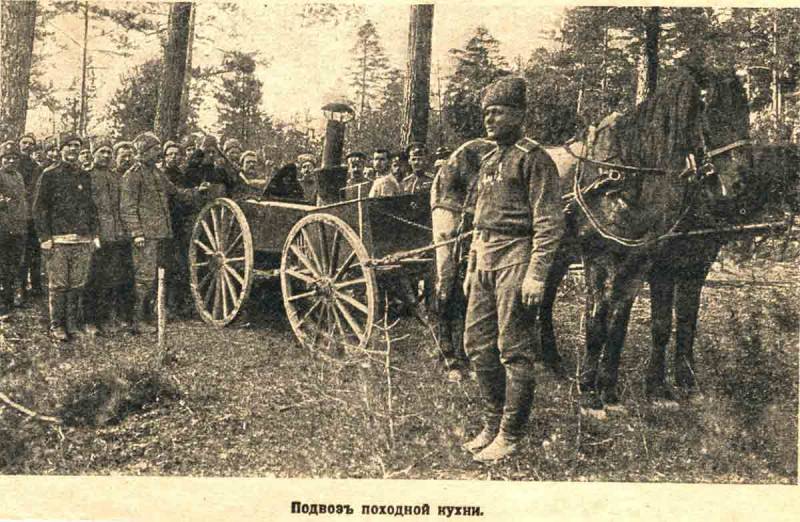
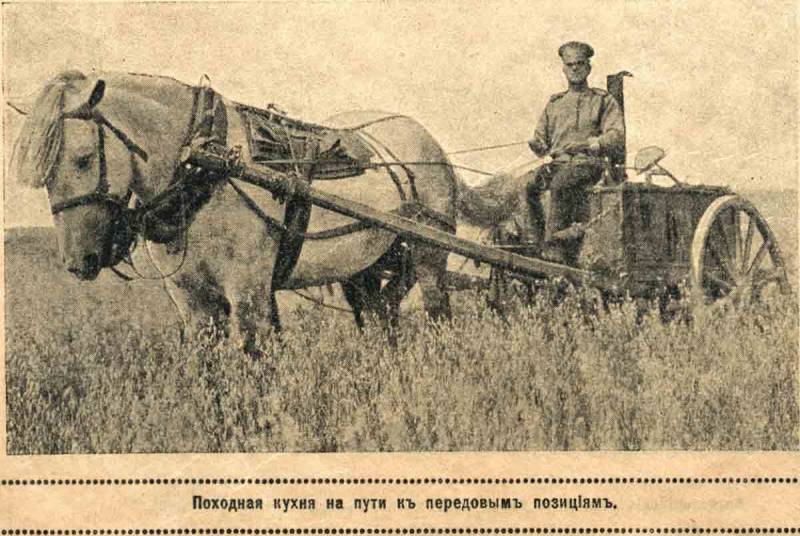
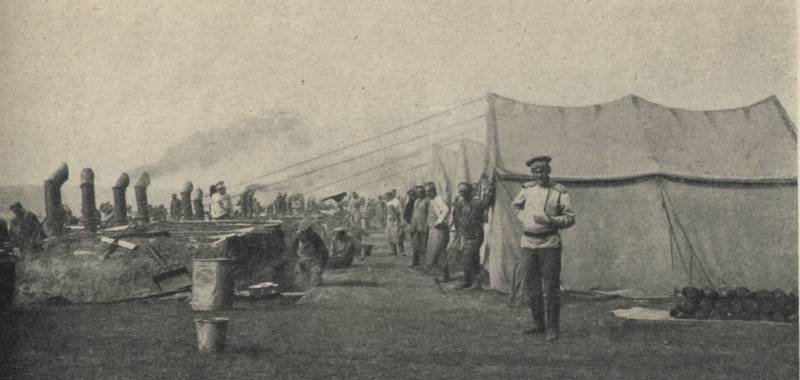
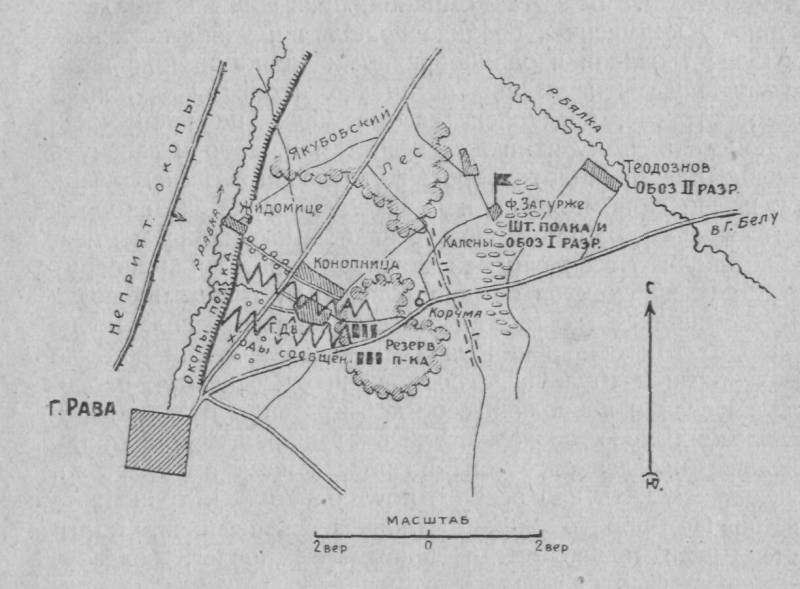
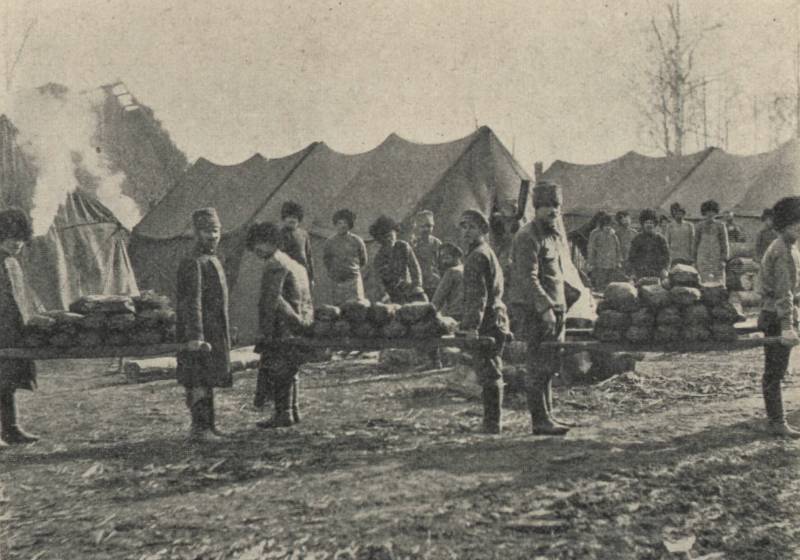
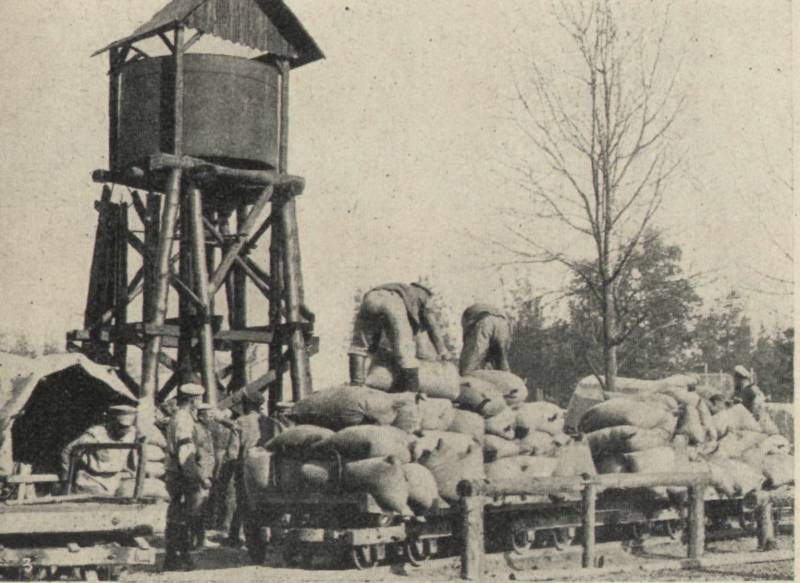
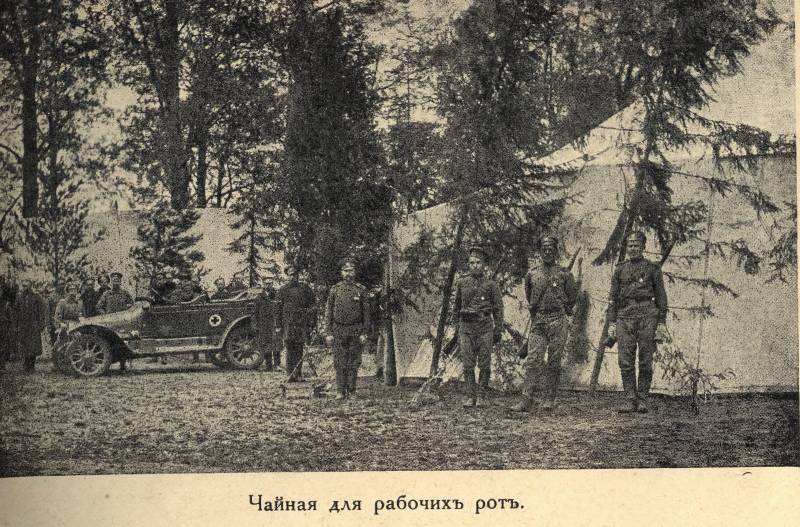
Information